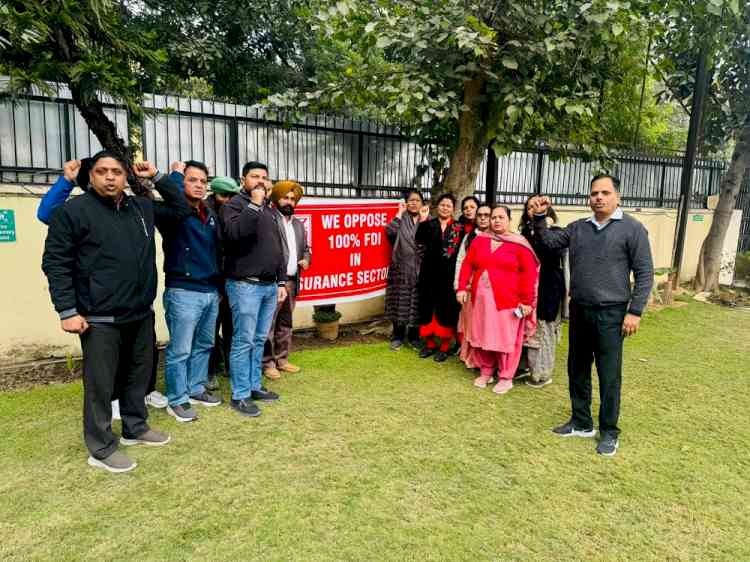FDI hike in Insurance Sector undesirable: AIIEA
Members of the All India Insurance Employees’ Association (AIIEA) under the leadership of Divisional Secretary Maan Singh held a demonstration here today.

Ludhiana, February 4, 2025: Members of the All India Insurance Employees’ Association (AIIEA) under the leadership of Divisional Secretary Maan Singh held a demonstration here today.
Speaking on the occasion, he said the Union Finance Minister during the course of Budget presentation announced the hike in FDI limits in insurance sector to 100% from the present 74%. This decision is unwarranted and carries with it serious consequences for mobilization of precious resources for the development of Indian economy and meeting the obligation of
the State towards its citizens. The AIIEA condemns this decision and will mobilise the public opinion against this move.
He said the Insurance sector was denationalised with the passage of the IRDA Bill 1999. This Act permitted the Indian capital to operate in the insurance industry in partnership with the foreign companies. The FDI was restricted to 26 percent; since then, it has been raised to 74%. A large number of private insurance companies with foreign partners have been operating in both the life and non-life insurance industry. Capital has never been a constraint for these companies to run their businesses; as they are owned by big business houses partnering with top multinational companies. Perhaps with the exception of one, no
insurance company is anywhere near breaching the 74% FDI limit. In fact, the total FDI in insurance is only around 32% of the capital employed. This being the case, it is surprising as to why the government has taken the step to give total freedom to foreign capital to operate in India. This decision will also have serious consequences for the Indian companies and the Indian economy if the existing foreign partner decides to pull out to form a separate company. There could also be hostile bids to take over the existing companies.
Adding, he said the AIIEA is of the firm understanding that allowing total freedom and greater access to foreign capital could only retard the orderly growth of the insurance industry with the focus more on profits rather than providing the people and business the much needed security. It will have disastrous impact on the interests of the marginalised sections of the Indian society. Moreover, foreign capital can never be a substitute to the domestic savings. This being the case, handing over the domestic savings to foreign capital makes no economic or social sense. India being a welfare state must necessarily have greater state control over the savings for economic development which benefits all its citizens.
He said there are also reports that the government intends to bring a comprehensive legislation amending the existing insurance laws. These amendments would take back the country to pre-1956 situation which compelled the government to nationalise the life insurance business. The government then heeded the warning that insurance should not be allowed under the control of financiers. But the present government is now handing over the insurance sector to the financiers and bankers which poses great risk to the savings of the people.
Adding, he said it is condemnable that the budget is banking upon a small section of the population to propel economic growth while neglecting the interests of the overwhelming majority. It has refused to impose a reasonable level of taxation on the corporate sector. The Economic Survey points out to the fact that while profits of the corporate sector are zooming, the wages of the workers are stagnating. The Budget makes no effort to help the workers to improve their life standards.
Further, he said the AIIEA lodges its strong protest against the decision to hike FDI limit in insurance and demands withdrawal of this move. It also warns the government against the retrograde proposal to amend the Insurance Laws viz; Insurance Act 1938, LIC Act 1956 and IRDA Act 1999. It demands the reorientation of economic policies from the corporate bias to people centric measures. The government must place the interests of the people above that of profits for the corporate sector.


 City Air News
City Air News 











